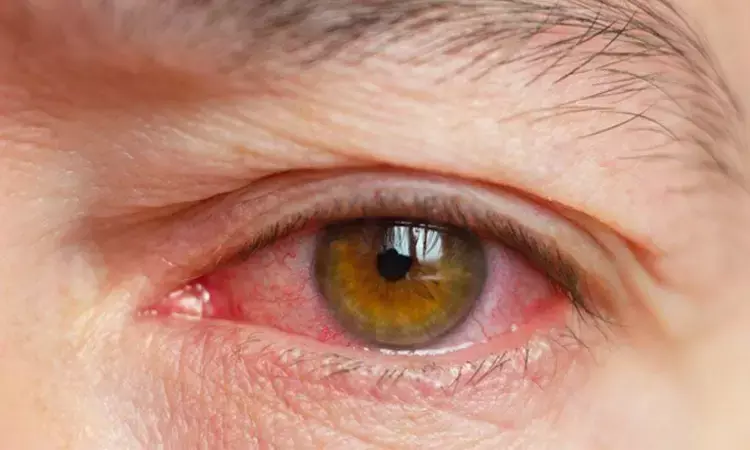- Home
- Medical news & Guidelines
- Anesthesiology
- Cardiology and CTVS
- Critical Care
- Dentistry
- Dermatology
- Diabetes and Endocrinology
- ENT
- Gastroenterology
- Medicine
- Nephrology
- Neurology
- Obstretics-Gynaecology
- Oncology
- Ophthalmology
- Orthopaedics
- Pediatrics-Neonatology
- Psychiatry
- Pulmonology
- Radiology
- Surgery
- Urology
- Laboratory Medicine
- Diet
- Nursing
- Paramedical
- Physiotherapy
- Health news
- Fact Check
- Bone Health Fact Check
- Brain Health Fact Check
- Cancer Related Fact Check
- Child Care Fact Check
- Dental and oral health fact check
- Diabetes and metabolic health fact check
- Diet and Nutrition Fact Check
- Eye and ENT Care Fact Check
- Fitness fact check
- Gut health fact check
- Heart health fact check
- Kidney health fact check
- Medical education fact check
- Men's health fact check
- Respiratory fact check
- Skin and hair care fact check
- Vaccine and Immunization fact check
- Women's health fact check
- AYUSH
- State News
- Andaman and Nicobar Islands
- Andhra Pradesh
- Arunachal Pradesh
- Assam
- Bihar
- Chandigarh
- Chattisgarh
- Dadra and Nagar Haveli
- Daman and Diu
- Delhi
- Goa
- Gujarat
- Haryana
- Himachal Pradesh
- Jammu & Kashmir
- Jharkhand
- Karnataka
- Kerala
- Ladakh
- Lakshadweep
- Madhya Pradesh
- Maharashtra
- Manipur
- Meghalaya
- Mizoram
- Nagaland
- Odisha
- Puducherry
- Punjab
- Rajasthan
- Sikkim
- Tamil Nadu
- Telangana
- Tripura
- Uttar Pradesh
- Uttrakhand
- West Bengal
- Medical Education
- Industry
Individuals with dry eye more likely to experience worse sleep quality, study shows distinct patterns

China: A recent meta-analysis published in BMC Ophthalmology has revealed worse sleep quality in individuals with dry eye than in the healthy population. They also reported a higher risk of unhealthy sleep duration such as insufficient sleep or excessive sleepiness, longer sleep latency, and poorer subjective sleep quality.
Dry eye disease (DED) is a common ocular condition affecting millions worldwide, characterized by discomfort, visual disturbances, and potential damage to the ocular surface. Recent research has begun to uncover a potential link between DED and sleep quality, suggesting that the health of our eyes may be intertwined with the quality of our sleep.
Against the above background, Lei Tian, Capital Medical University, Beijing, China, and colleagues aimed to review the association between dry eye and sleep quality systematically.
For this purpose, they searched the online databases for observational studies published before April 2023. Meta-analysis was performed using STAT15 software. The meta-analysis included a total of 21 studies with 419,218 participants.
Based on the review, the researchers reported the following findings:
- Dry eye subjects had a worse sleep quality than the healthy population, with poorer subjective sleep quality, a higher risk of unhealthy sleep duration such as insufficient sleep or excessive sleep, and longer sleep latency.
- The Pittsburgh Sleep Quality Index (PSQI) scores of subjects with dry eye were significantly higher than those of the control subjects (WMD = 1.78).
- The dry eye subjects scored higher than the control subjects in sleep quality, sleep latency, and sleep disturbance in PSQI; there was no difference between the dry eye individuals and control subjects in sleep duration, sleep efficiency, daytime dysfunction, and sleep medication scores.
- The risk of sleep disorders in the dry eye subjects was significantly higher than that in the non-dry eye subjects (RR = 2.20); the risk of insufficient sleep in the dry eye subjects was higher than that in the control subjects (RR = 3.76), and the prevalence of excessive sleepiness in dry eye subjects was higher than that in the control subjects (RR = 5.53).
- The ESS scores of the dry eye subjects were significantly higher than those of the control subjects (WMD = 3.02).
The findings indicate that dry eye patients have a lower sleep quality than the healthy population, with longer sleep latency, poorer subjective sleep quality, and a higher risk of unhealthy sleep duration such as insufficient sleep or excessive sleep.
"However, so far, there is insufficient evidence to establish a causal relationship and related mechanisms between dry eye and sleep disorder," the researchers wrote. "In the future, there will be a need for more large-scale prospective studies to provide more assistance in patient management and treatment."
Reference:
Gu, Y., Cao, K., Li, A. et al. Association between sleep quality and dry eye disease: a literature review and meta-analysis. BMC Ophthalmol 24, 152 (2024). https://doi.org/10.1186/s12886-024-03416-7
Dr Kamal Kant Kohli-MBBS, DTCD- a chest specialist with more than 30 years of practice and a flair for writing clinical articles, Dr Kamal Kant Kohli joined Medical Dialogues as a Chief Editor of Medical News. Besides writing articles, as an editor, he proofreads and verifies all the medical content published on Medical Dialogues including those coming from journals, studies,medical conferences,guidelines etc. Email: drkohli@medicaldialogues.in. Contact no. 011-43720751


